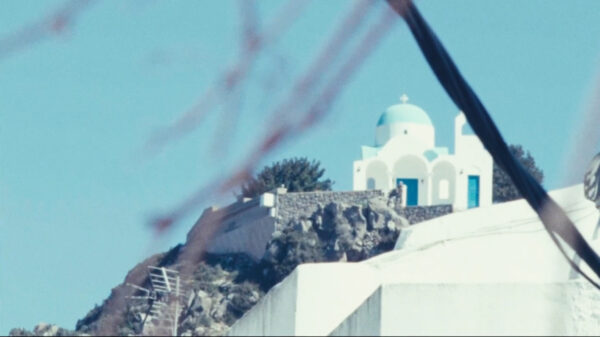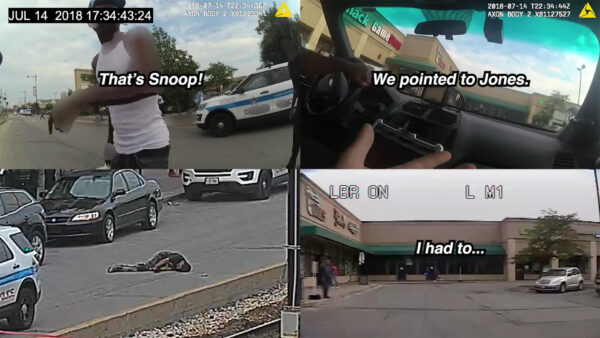Circle of Shame
The Smell of Burning Ants
In this haunting collage, Jay Rosenblatt reappropriates cautionary tales from educational films to illustrate the transgenerational cruelty that is boyhood. While facing uncomfortable truths, he also charts a path towards recovery.

On the edge of a well-trimmed lawn and pavement, two boys push and shove each other. A third and smaller one—a timid bystander, at first—sneaks in a punch under the ribs of a brawler. This brief image of a somewhat detached spectator entangled in a display of violence stirred a memory in Jay Rosenblatt and formed the basis for his breakthrough 1994 film The Smell of Burning Ants.
Rosenblatt found this scene among piles of 16mm educational films discarded en masse in the late 1980s and early 1990s when schools and other institutions switched to videocassettes. It took him back to his childhood in 1965 New York and the playground of his Brooklyn-based elementary school, where he was part of a bullying incident at one point. The footage not only jogged his childhood memory but also related to his time as a psychology student and counselor before he started making experimental short documentaries in San Francisco in the early eighties. All this ensured that Rosenblatt was familiar with classroom films that had been trying for decades to raise awareness about such topics as bullying, and with The Smell of Burning Ants, he wanted to present his take on it.
Using discarded scenes from an almost bygone tradition of educational films, Rosenblatt reflects on how an upbringing according to outdated, rigid gender norms breeds aggression as boys become men. Stirred by superimposed images of burning flames, scenes of animal cruelty, and an insistent soundtrack, Rosenblatt’s haunting collage reappropriates so-called morally edifying scenes and cautionary tales from abandoned educational films into an epitome of transgenerational cruelty. Rosenblatt centres his take on the educational film around an “everyboy” character who is spoon-fed physical and verbal violence, and acts accordingly.
In a study guide Rosenblatt prepared for the film, he writes that “[t]he sacred dismissal ‘boys will be boys’ evolves into a chilling realization that many boys are becoming angry, destructive, emotionally disabled men. They are socialized by fear, power, force, and shame.” The effect of shame in this dynamic is reflected in The Smell of Burning Ants when a young boy fears his father might have seen him being the target of ridicule out on the street: slowed-down footage shows a boy turning around to face his reproachful father standing behind him in the living room. Rosenblatt also stresses that bullying can arise as a deflector of one’s own fear of being (a)shamed. “Call everyone a faggot, then if they call you one, it won’t matter,” the voice-over that accompanies the collage of images throughout the film tells us.
That voice-over is by Richard J. Silberg, who, during his casting interview, turned out to be a former classmate of Rosenblatt’s who had memories of the bullying himself. This additional coincidence would later prompt Rosenblatt to make When We Were Bullies, in which he re-stages the 1965 incident—considerably slicker than in The Smell of Burning Ants—by talking to classmates who joined him in the bullying. In an interview with The New York Times about that 2021 film, he makes clear that shame is not only formative in peer group relations and within families but that it also plays a role in educational dynamics at school: their then-teacher had blasted the entire class about their behaviour towards the bullied boy. “She was right to shame us. One key to this whole story is that I don’t think I’d remember it if we hadn’t been caught,” Rosenblatt says. “There’s a lack of shame now in our culture. People try shaming each other on social media, but they do it anonymously. Obviously, shame can go overboard and become negative, but I think we need some of it to keep us in line as a culture.”
Apart from the reference to bullying culture—a hot topic in American media in 2021, the last year of Donald J. Trump’s presidency—Rosenblatt points to the socialising function of shame. Moreover, shame, or an active engagement with complex, often disagreeable human traits, is also a driving force of The Smell of Burning Ants and some of Rosenblatt’s other films, such as Human Remains (1998), I Just Wanted To Be Somebody (2006), The Darkness of Day (2009). It is remarkable, in this regard, that he links the covert violence of bullying not only to himself as a ten-year-old boy but also to filmmaking.
In the scene that sparked Rosenblatt’s memory, the detached bully is labelled an observer, and in the remainder of The Smell of Burning Ants, Rosenblatt replays the same image of a boy looking at us from behind a camera. By repeatedly returning to this image throughout his flowing collage, Rosenblatt emphasises the connection between the filmmaker (himself) and the boy who transitions from an observing bystander to participating bully in the primal scene of this short.
Early on in his film, Rosenblatt cuts from the removal of a baby boy’s umbilical cord to a pair of scissors cutting a film strip; with his montage, he suggests that male violence and filmmaking are inextricably linked. Not only do the scenes in Rosenblatt’s portrait of the sadist as a very young man teem with (explicit and suggested) violence, but the medium film itself is also intrinsically aggressive. In this regard, it is remarkable that Rosenblatt prefers to refer “without shame” to rearranging found footage as “manipulation” in a Dutch article11 Dana Linssen, ‘“Een etende Hitler is erg verontrustend.” Gesprek met filmmaker Jay Rosenblatt’, NRC Handelsblad, June 6, 1998, p. 9. ↩︎ published on the occasion of a 1998 screening tour in Belgium and the Netherlands. Apparently, making a film is a form of abuse, even if the filmmaker does not have to feel guilty about it.
Unlike Buñuel’s classic Un chien andalou, which the titular recurring crawling ants remind us of, Rosenblatt does not want to push disruption to the extreme. Although the immersion in violence through which the boy comes to maturity leads to “possible rape” (according to the director himself in his guide), the film’s final message, “for all my brothers”, ultimately brings the (male) spectator to “a call to begin the process of healing”. The counselor that is Rosenblatt makes sure The Smell of Burning Ants faces uncomfortable truths but, above all, charts a path towards recovery.
On the occasion of its 40th anniversary, Kurzfilm Festival Hamburg asked former artistic directors and festival workers to pick a film from the past years to be screened during this year’s festival opening programme. Astrid Kühl chose The Smell of Burning Ants, which gave Talking Shorts a great opportunity to look back at the film as well.





There are no comments yet, be the first!